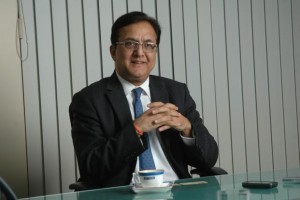Even though the Manmohan Singh government had quite a conspicuous bunch of top-notch economists backing the Indian economic policies during the UPA regime, the economic scene in India was pretty much mundane until the entry of Raghuram Rajan as the RBI Chief.
The NDA government, with relatively thinner intellectual bench, has done a commendable job by roping in Arvind Subramanian as the chief economic adviser. More than achieving an equaliser of Rajan by calling Arvind in, Modi has made a double win, as the Rajan-Subramanian duo that we now have is actually a blessing for the country and yet another invitation to achche din.
Subramanian may soon find out that giving logical policy recommendations for a country like India is easier than sketching out policies for it. Subramanian’s heavyweight CV is worth a look for all those who will be pinning hopes to him for a much pellucid and stable economic atmosphere.
His accomplishments connote St. Stephen’s to IIM to Oxford and encompass GATT along with prestigious workplaces and offices like Harvard University, International Monetary Fund and the Peterson Institute for International Economics.
He also has commendable papers to his acclaim on a variety of topics from intellectual property to trade, from climate change to corruption to China. He is a voracious reader, has probably cover to cover gone through 150 books last year by one account – memoirs, biographies, Literature and books on economics. He’s a jogger, a swimmer and a diehard Arsenal fan.
There’s no doubt about his exceptional brightness and the fact that he is an independent thinker, and can move debates in New Delhi singlehanded. After all, in the past few years, the US Congress and the administration has constantly sought his views on India’s trade and economic policies, especially when criticism from the American business lobby was on the rise, he brought balance to the situation.
Also read: India Ranks 142 among 182 countries in ‘Ease of Doing Business’ Report by World Bank
Why so late?
Given his accomplishments, questions are being raised as to why he has been inducted so late. There are many theories that have been raised in answer. Even though Subramanian had been on the government’s agenda, somehow things took long to materialise. One theory is that even when he was approaching the ‘finishing line’ of government approval, he stepped back several times because of personal reasons. It is reported that P Chidambaram was even highly irritated at one point of time. However, he has been gracious in welcoming him.
Another theory is that Subramanian was keen for the position and was kept pressing his case ever since Rajan attained the position of RBI as governor. It isn’t surprising to come to know this, as the post of India’s chief economic adviser is not a small thing, even for somebody who’s been long gaining praises abroad. It is obvious that the real deal is to be the star at home.
Would he fit in?
Apprehensions are looming large about his induction and whether he will fit in the existing Indian economic system. The present government does demand a certain demeanour, mind-set and even a Zen attitude. The government holds a good control over the messages it gives out and the men it has.
Given his personality, Subramanian might have to ‘adjust’ initially. Until now he has had the liberty to deal with the world on his own terms, with complete intellectual abandon, he has been doing exactly as he wanted. The man even skim in and out of the confined world of the IMF where strict codes of behaviour are practiced.
Coming to Peterson Institute, his duties were not fixed and his responsibilities were limited to publish research papers, – write books, testify in front of the US Congress when needed – and keep the organisational flag flying – which pretty much was just ‘being himself’ in the name of his responsibilities at the place of work. In addition, the fact that he was a senior fellow at the Center for Global Development supplemented his freedom.
Those who know him well, say that he doesn’t suffer fools gladly, he’s aware of his intelligence and doesn’t shy away from it. Ask why should he? Well, in a perfect world, he isn’t needed to. But, the government is not a free society. More so, sometimes one has to act dumb to play smart.
How the government’s going to work around it:
If the Modi government doesn’t succeed in tapping is full potential outside the definitions of his job, it would be very foolish on its part. Subramanian very well understands the US and China mind-sets.
A review once quoted about his book published in 2011, Eclipse: Living in the Shadow of China’s Economic Dominance, puts forth a view that: “by 2020, China will tower over the world as the US did after World War II. Countries must come together and bind China to the multilateral system before it becomes a “hegemon” instead of trying to make separate deals with Beijing.”
Since the two bright Indian economists, Subramanian and Rajan, are home now, we can hope the economy will go into raptures as the interplay of their minds and Modi’s policies viewpoints will craft useful policies in India instead of the ‘showy’ ones.
Also read: ADR Analysis proves that MLAs are Getting Richer Faster than MPs
About Tushita
Tushita is a political writer at thenational.net. Her deep rooted interest in politics, passion for writing and craze for travelling define her. Writing since her school days, she aspires to write lifelong and make the world a happier place to live with the power of her pen.




















